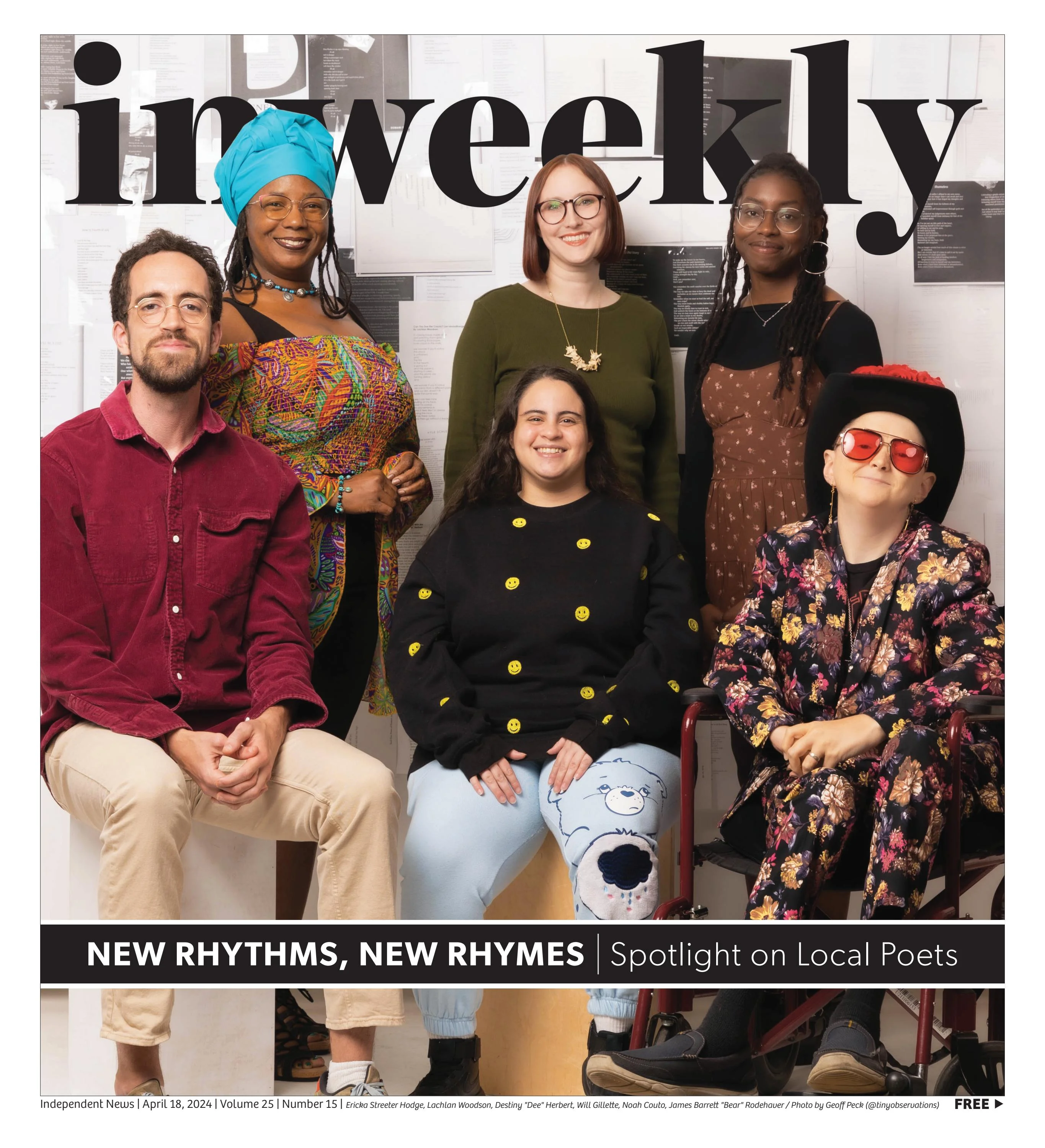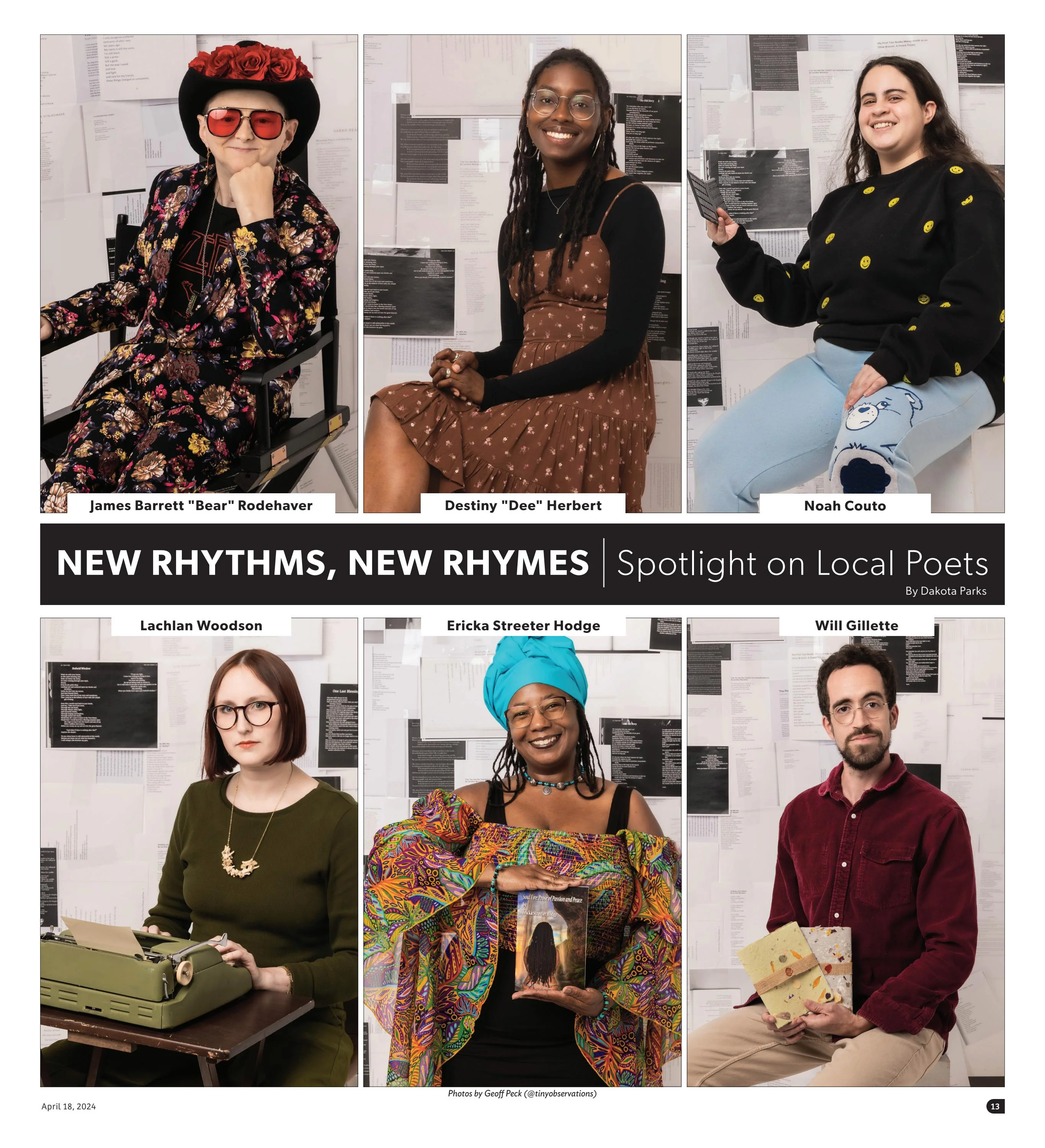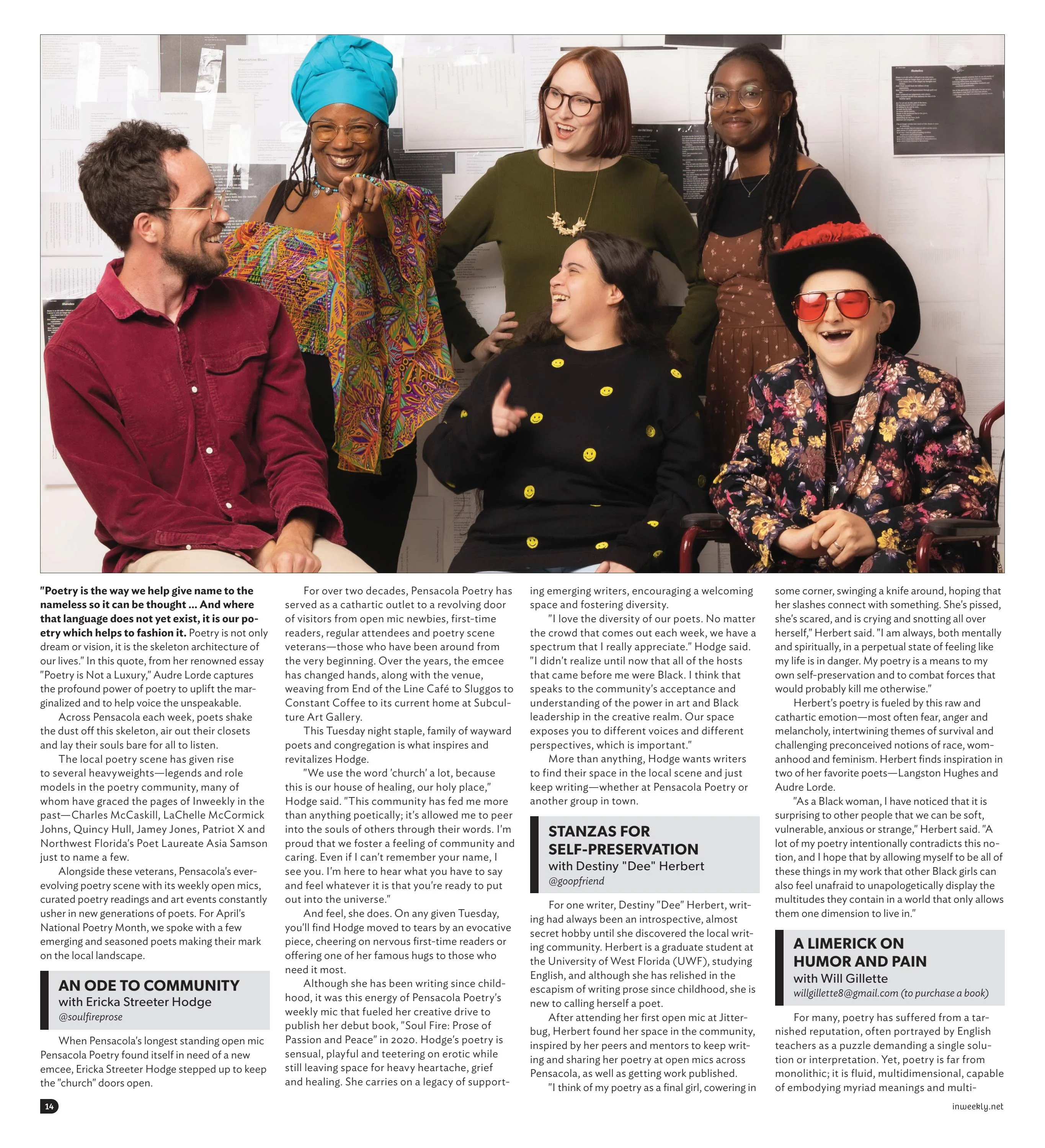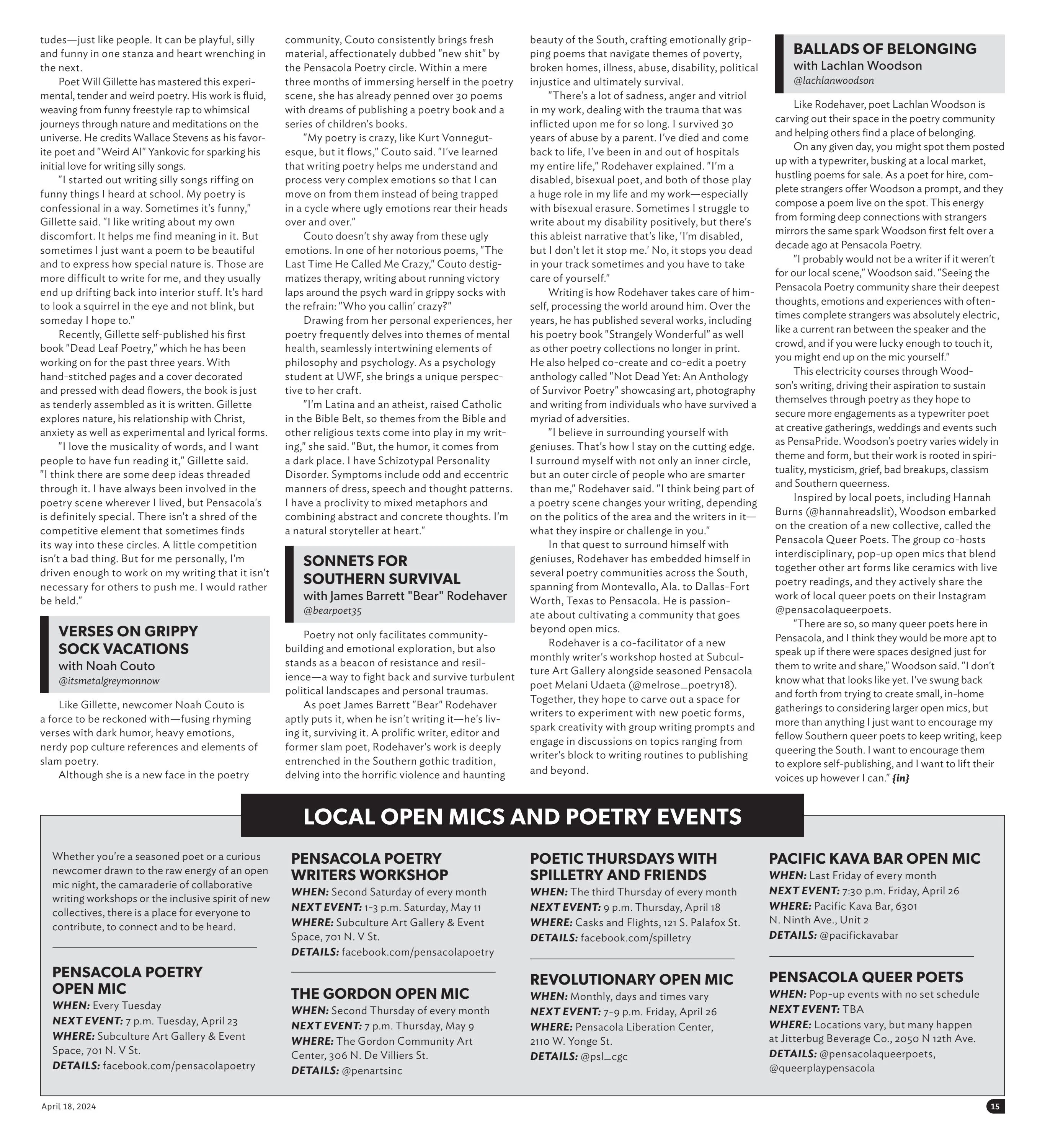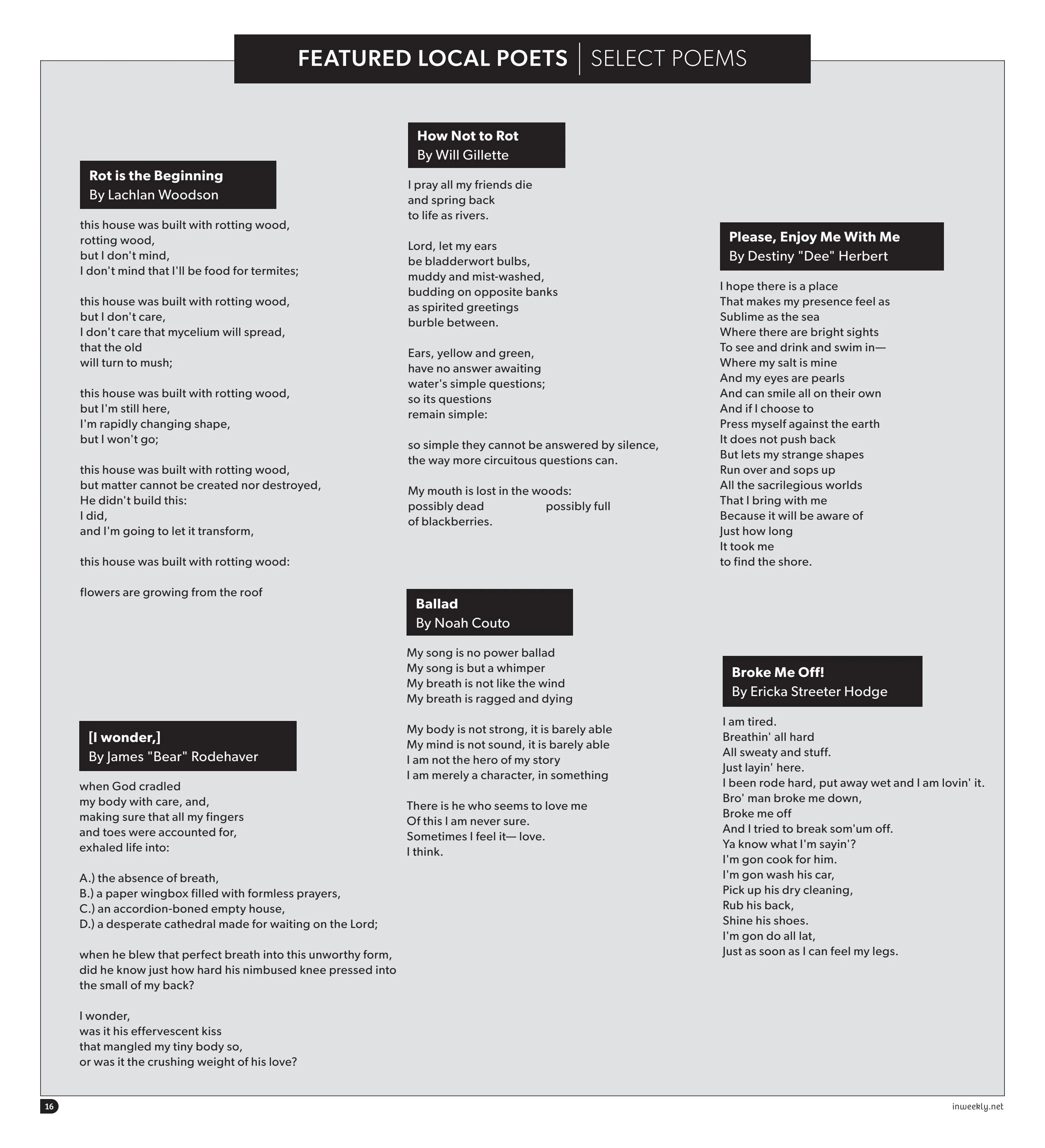New Rhythms, New Rhymes: Spotlight on Local Poets
- Dakota Parks

- Apr 17, 2024
- 10 min read
By Dakota Parks for Inweekly
“Poetry is the way we help give name to the nameless so it can be thought … And where that language does not yet exist, it is our poetry which helps to fashion it. Poetry is not only dream or vision, it is the skeleton architecture of our lives.” In this quote, from her renowned essay “Poetry is Not a Luxury,” Audre Lorde captures the profound power of poetry to uplift the marginalized and to help voice the unspeakable.
Across Pensacola each week, poets shake the dust off this skeleton, air out their closets and lay their souls bare for all to listen.
The local poetry scene has given rise to several heavyweights—legends and role models in the poetry community, many of whom have graced the pages of Inweekly in the past—Charles McCaskill, LaChelle McCormick Johns, Quincy Hull, Jamey Jones, Patriot X and Northwest Florida’s Poet Laureate Asia Samson just to name a few.
Alongside these veterans, Pensacola’s ever-evolving poetry scene with its weekly open mics, curated poetry readings and art events constantly usher in new generations of poets. For April’s National Poetry Month, we spoke with a few emerging and seasoned poets making their mark on the local landscape.
—An Ode to Community—
with Ericka Streeter Hodge
@soulfireprose
When Pensacola’s longest standing open mic Pensacola Poetry found itself in need of a new emcee, Ericka Streeter Hodge stepped up to keep the “church” doors open.
For over two decades, Pensacola Poetry has served as a cathartic outlet to a revolving door of visitors from open mic newbies, first-time readers, regular attendees and poetry scene veterans—those who have been around from the very beginning. Over the years, the emcee has changed hands, along with the venue, weaving from End of the Line Café to Sluggos to Constant Coffee to its current home at Subculture Art Gallery.
This Tuesday night staple, family of wayward poets and congregation is what inspires and revitalizes Hodge.
“We use the word ‘church’ a lot, because this is our house of healing, our holy place,” Hodge said. “This community has fed me more than anything poetically; it’s allowed me to peer into the souls of others through their words. I’m proud that we foster a feeling of community and caring. Even if I can’t remember your name, I see you. I’m here to hear what you have to say and feel whatever it is that you’re ready to put out into the universe.”
And feel, she does. On any given Tuesday, you’ll find Hodge moved to tears by an evocative piece, cheering on nervous first-time readers or offering one of her famous hugs to those who need it most.
Although she has been writing since childhood, it was this energy of Pensacola Poetry’s weekly mic that fueled her creative drive to publish her debut book, “Soul Fire: Prose of Passion and Peace” in 2020. Hodge’s poetry is sensual, playful and teetering on erotic while still leaving space for heavy heartache, grief and healing. She carries on a legacy of supporting emerging writers, encouraging a welcoming space and fostering diversity.
“I love the diversity of our poets. No matter the crowd that comes out each week, we have a spectrum that I really appreciate.” Hodge said. “I didn’t realize until now that all of the hosts that came before me were Black. I think that speaks to the community’s acceptance and understanding of the power in art and Black leadership in the creative realm. Our space exposes you to different voices and different perspectives, which is important.”
More than anything, Hodge wants writers to find their space in the local scene and just keep writing—whether at Pensacola Poetry or another group in town.
—Stanzas for Self-Preservation—
with Destiny “Dee” Herbert
@goopfriend
For one writer, Destiny “Dee” Herbert, writing had always been an introspective, almost secret hobby until she discovered the local writing community. Herbert is a graduate student at the University of West Florida (UWF), studying English, and although she has relished in the escapism of writing prose since childhood, she is new to calling herself a poet.
After attending her first open mic at Jitterbug, Herbert found her space in the community, inspired by her peers and mentors to keep writing and sharing her poetry at open mics across Pensacola, as well as getting work published.
“I think of my poetry as a final girl, cowering in some corner, swinging a knife around, hoping that her slashes connect with something. She’s pissed, she’s scared, and is crying and snotting all over herself,” Herbert said. “I am always, both mentally and spiritually, in a perpetual state of feeling like my life is in danger. My poetry is a means to my own self-preservation and to combat forces that would probably kill me otherwise.”
Herbert’s poetry is fueled by this raw and cathartic emotion—most often fear, anger and melancholy, intertwining themes of survival and challenging preconceived notions of race, womanhood and feminism. Herbert finds inspiration in two of her favorite poets—Langston Hughes and Audre Lorde.
“As a Black woman, I have noticed that it is surprising to other people that we can be soft, vulnerable, anxious or strange,” Herbert said. “A lot of my poetry intentionally contradicts this notion, and I hope that by allowing myself to be all of these things in my work that other Black girls can also feel unafraid to unapologetically display the multitudes they contain in a world that only allows them one dimension to live in.”
—A Limerick on Humor and Pain—
with Will
Gillettewillgillette8@gmail.com (to purchase a book)
For many, poetry has suffered from a tarnished reputation, often portrayed by English teachers as a puzzle demanding a single solution or interpretation. Yet, poetry is far from monolithic; it is fluid, multidimensional, capable of embodying myriad meanings and multitudes—just like people. It can be playful, silly and funny in one stanza and heart wrenching in the next.
Poet Will Gillette has mastered this experimental, tender and weird poetry. His work is fluid, weaving from funny freestyle rap to whimsical journeys through nature and meditations on the universe. He credits Wallace Stevens as his favorite poet and “Weird Al” Yankovic for sparking his initial love for writing silly songs.
“I started out writing silly songs riffing on funny things I heard at school. My poetry is confessional in a way. Sometimes it’s funny,” Gillette said. “I like writing about my own discomfort. It helps me find meaning in it. But sometimes I just want a poem to be beautiful and to express how special nature is. Those are more difficult to write for me, and they usually end up drifting back into interior stuff. It’s hard to look a squirrel in the eye and not blink, but someday I hope to.”
Recently, Gillette self-published his first book “Dead Leaf Poetry,” which he has been working on for the past three years. With hand-stitched pages and a cover decorated and pressed with dead flowers, the book is just as tenderly assembled as it is written. Gillette explores nature, his relationship with Christ, anxiety as well as experimental and lyrical forms.
“I love the musicality of words, and I want people to have fun reading it,” Gillette said. “I think there are some deep ideas threaded through it. I have always been involved in the poetry scene wherever I lived, but Pensacola’s is definitely special. There isn’t a shred of the competitive element that sometimes finds its way into these circles. A little competition isn’t a bad thing. But for me personally, I’m driven enough to work on my writing that it isn’t necessary for others to push me. I would rather be held.”
—Verses on Grippy Sock Vacations—
with Noah Couto
@itsmetalgreymonnow
Like Gillette, newcomer Noah Couto is a force to be reckoned with—fusing rhyming verses with dark humor, heavy emotions, nerdy pop culture references and elements of slam poetry.
Although she is a new face in the poetry community, Couto consistently brings fresh material, affectionately dubbed “new shit” by the Pensacola Poetry circle. Within a mere three months of immersing herself in the poetry scene, she has already penned over 30 poems with dreams of publishing a poetry book and a series of children’s books.
“My poetry is crazy, like Kurt Vonnegut-esque, but it flows,” Couto said. “I’ve learned that writing poetry helps me understand and process very complex emotions so that I can move on from them instead of being trapped in a cycle where ugly emotions rear their heads over and over.”
Couto doesn’t shy away from these ugly emotions. In one of her notorious poems, “The Last Time He Called Me Crazy,” Couto destigmatizes therapy, writing about running victory laps around the psych ward in grippy socks with the refrain: “Who you callin’ crazy?”
Drawing from her personal experiences, her poetry frequently delves into themes of mental health, seamlessly intertwining elements of philosophy and psychology. As a psychology student at UWF, she brings a unique perspective to her craft.
“I’m Latina and an atheist, raised Catholic in the Bible Belt, so themes from the Bible and other religious texts come into play in my writing,” she said. “But, the humor, it comes from a dark place. I have Schizotypal Personality Disorder. Symptoms include odd and eccentric manners of dress, speech and thought patterns. I have a proclivity to mixed metaphors and combining abstract and concrete thoughts. I’m a natural storyteller at heart.”
—Sonnets for Southern Survival—
with James Barrett “Bear” Rodehaver
@bearpoet35
Poetry not only facilitates community-building and emotional exploration, but also stands as a beacon of resistance and resilience—a way to fight back and survive turbulent political landscapes and personal traumas.
As poet James Barrett “Bear” Rodehaver aptly puts it, when he isn’t writing it—he’s living it, surviving it. A prolific writer, editor and former slam poet, Rodehaver’s work is deeply entrenched in the Southern gothic tradition, delving into the horrific violence and haunting beauty of the South, crafting emotionally gripping poems that navigate themes of poverty, broken homes, illness, abuse, disability, political injustice and ultimately survival.
“There’s a lot of sadness, anger and vitriol in my work, dealing with the trauma that was inflicted upon me for so long. I survived 30 years of abuse by a parent. I’ve died and come back to life, I’ve been in and out of hospitals my entire life,” Rodehaver explained. “I’m a disabled, bisexual poet, and both of those play a huge role in my life and my work—especially with bisexual erasure. Sometimes I struggle to write about my disability positively, but there’s this ableist narrative that’s like, ‘I’m disabled, but I don’t let it stop me.’ No, it stops you dead in your track sometimes and you have to take care of yourself.”
Writing is how Rodehaver takes care of himself, processing the world around him. Over the years, he has published several works, including his poetry book “Strangely Wonderful” as well as other poetry collections no longer in print. He also helped co-create and co-edit a poetry anthology called “Not Dead Yet: An Anthology of Survivor Poetry” showcasing art, photography and writing from individuals who have survived a myriad of adversities.
“I believe in surrounding yourself with geniuses. That’s how I stay on the cutting edge. I surround myself with not only an inner circle, but an outer circle of people who are smarter than me,” Rodehaver said. “I think being part of a poetry scene changes your writing, depending on the politics of the area and the writers in it—what they inspire or challenge in you.”
In that quest to surround himself with geniuses, Rodehaver has embedded himself in several poetry communities across the South, spanning from Montevallo, Ala. to Dallas-Fort Worth, Texas to Pensacola. He is passionate about cultivating a community that goes beyond open mics.
Rodehaver is a co-facilitator of a new monthly writer’s workshop hosted at Subculture Art Gallery alongside seasoned Pensacola poet Melani Udaeta (@melrose_poetry18). Together, they hope to carve out a space for writers to experiment with new poetic forms, spark creativity with group writing prompts and engage in discussions on topics ranging from writer’s block to writing routines to publishing and beyond.
—Ballads of Belonging—
with Lachlan Woodson
@lachlanwoodson
Like Rodehaver, poet Lachlan Woodson is carving out their space in the poetry community and helping others find a place of belonging.
On any given day, you might spot them posted up with a typewriter, busking at a local market, hustling poems for sale. As a poet for hire, complete strangers offer Woodson a prompt, and they compose a poem live on the spot. This energy from forming deep connections with strangers mirrors the same spark Woodson first felt over a decade ago at Pensacola Poetry.
“I probably would not be a writer if it weren’t for our local scene,” Woodson said. “Seeing the Pensacola Poetry community share their deepest thoughts, emotions and experiences with oftentimes complete strangers was absolutely electric, like a current ran between the speaker and the crowd, and if you were lucky enough to touch it, you might end up on the mic yourself.”
This electricity courses through Woodson’s writing, driving their aspiration to sustain themselves through poetry as they hope to secure more engagements as a typewriter poet at creative gatherings, weddings and events such as PensaPride. Woodson’s poetry varies widely in theme and form, but their work is rooted in spirituality, mysticism, grief, bad breakups, classism and Southern queerness.
Inspired by local poets, including Hannah Burns (@hannahreadslit), Woodson embarked on the creation of a new collective, called the Pensacola Queer Poets. The group co-hosts interdisciplinary, pop-up open mics that blend together other art forms like ceramics with live poetry readings, and they actively share the work of local queer poets on their Instagram @pensacolaqueerpoets.
“There are so, so many queer poets here in Pensacola, and I think they would be more apt to speak up if there were spaces designed just for them to write and share,” Woodson said. “I don’t know what that looks like yet. I’ve swung back and forth from trying to create small, in-home gatherings to considering larger open mics, but more than anything I just want to encourage my fellow Southern queer poets to keep writing, keep queering the South. I want to encourage them to explore self-publishing, and I want to lift their voices up however I can.”
————————————————————————-
Local Open Mics and Poetry Events
Whether you’re a seasoned poet or a curious newcomer drawn to the raw energy of an open mic night, the camaraderie of collaborative writing workshops or the inclusive spirit of new collectives, there is a place for everyone to contribute, to connect and to be heard.
Pensacola Poetry Open Mic
When: Every Tuesday
Next Event: 7 p.m. Tuesday, April 23
Where: Subculture Art Gallery & Event Space, 701 N. V St.
Details: facebook.com/pensacolapoetry
Pensacola Poetry Writers Workshop
When: Second Saturday of every month
Next Event: 1-3 p.m. Saturday, May 11
Where: Subculture Art Gallery & Event Space, 701 N. V St.
Details: facebook.com/pensacolapoetry
The Gordon Open Mic
When: Second Thursday of every month
Next Event: 7 p.m. Thursday, May 9
Where: The Gordon Community Art Center, 306 N. De Villiers St.
Details: @penartsinc
Poetic Thursdays with Spilletry and Friends
When: The third Thursday of every month
Next Event: 9 p.m. Thursday, April 18
Where: Casks and Flights, 121 S. Palafox St.
Details: facebook.com/spilletry
Revolutionary Open Mic
When: Monthly, days and times vary
Next Event: 7-9 p.m. Friday, April 26
Where: Pensacola Liberation Center, 2110 W. Yonge St.
Details: @psl_cgc
Pacific Kava Bar Open Mic
When: Last Friday of every month
Next Event: 7:30 p.m. Friday, April 26
Where: Pacific Kava Bar, 6301 N. Ninth Ave., Unit 2
Details: @pacifickavabar
Pensacola Queer Poets
When: Pop-up events with no set schedule
Next Event: TBA
Where: Locations vary, but many happen at Jitterbug Beverage Co., 2050 N 12th Ave.
Details: @pensacolaqueerpoets, @queerplaypensacola

